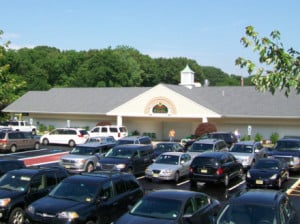
The water was reasonably warm the first two weekends that the Verona Pool was open. This weekend, after a spate of cool weather and two days of rain, we probably won’t be as lucky. And when the water gets cold in the pool, many of the grownups who have to go in wonder why it couldn’t be heated, especially by some of the sun that shines so abundantly on the pool grounds.
The answer is, it could be, and maybe soon.
There are two different ways to heat a pool: Running water through a solar collector to heat it or using solar panels to generate electricity to run a pool heater. But the Verona Pool only needs the warmth in June (you wouldn’t want it as warm as the baby pool in August, right?) and rigging a collector to divert hot water to the showers in July and August would be quite an undertaking.
Using solar panels to generate electricity that could be used in a variety of ways–from water heating to floodlights–is a better option and the Verona Pool is solar-panel ready. When it was renovated last year, the roof over the snack bar and changing rooms was changed from a flat roof to a pitched one that could support solar panels. The gazebo also has a nicely pitched roof. And Verona already has a lot of experience with solar installations: We currently capture solar power from the roofs of the Verona Community Center and the town’s maintenance garage, as well as from ground-based panels at the wastewater treatment plant. (The Verona Environmental Commission has details on all three installations in the Clean Energy section of its Web site.)
Every panel the town installs cuts its utility bill and generates a Solar Renewable Energy Credit that can be bought back by a utility. When Verona installed its first panels three years ago, SRECs were valued at about $300 apiece; they are now trading at $700. Verona currently earns about $75,000 a year from selling its SRECs, according to Township Manager Joe Martin.
Bob Prout, owner of the solar-powered Prout Funeral Home on Bloomfield Avenue, applauds the town’s efforts. “Verona has been very proactive on sustainability,” he says. “We are way ahead of our neighbors.”
Verona’s three existing solar installations are on facilities that are used all year. The pool isn’t, and that has been the sticking point in getting solar power there.
The maximum allowable size of a solar installation depends on a building’s annual electricity usage. The Verona Pool’s three months of operation would have to be treated like 12, which wouldn’t let us put in very many panels at all, and wouldn’t be cost effective. The solution, says Martin, would be for all of Verona’s solar buildings to be on a single meter so the usage could be more broadly based, but PSEG hasn’t allowed that–until now.
Just this past week, Verona Township Engineer Jim Helb got an email from the utility inviting Verona to participate in a pilot program on single metering. As of yesterday, Martin didn’t know when the program would begin and PSEG did not respond to a call for comment. But maybe, just maybe, the water could be warm for next year’s Memorial Day kick-off to the pool season.
“Solar makes sense,” says Prout, who uses the solar panels on both his building and the retaining wall in his parking lot to cover virtually all of his business’ electricity needs. “It will reduce our energy bill now and contain it in the future.”

